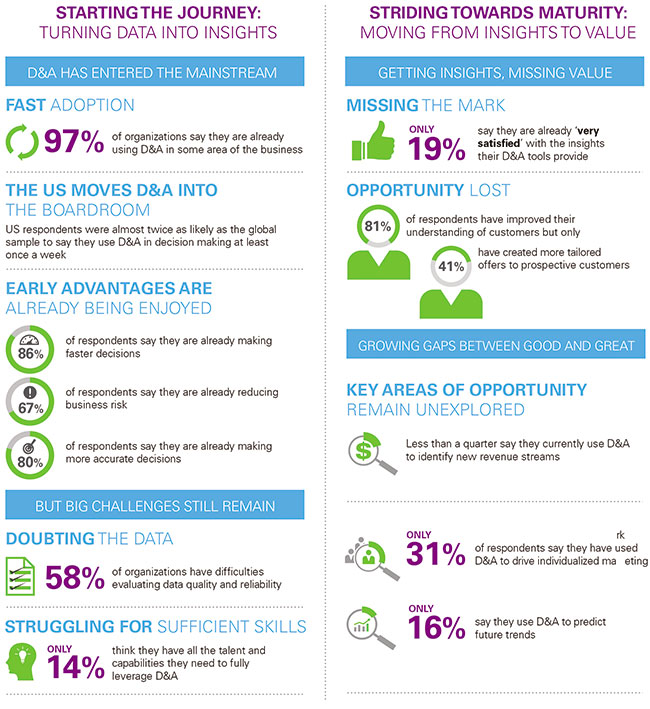Big Data and the revolutionary trend

400 of Vietnam’s leading businesspeople will attend the SMAC 2015: Connecting Values
– Evoking Potentials event to be held in Ho Chi Minh City on December 2
The latest trends in the application of future technologies such as Big Data and Cloud into business and management will be discussed at “SMAC 2015: Connecting values – Evoking potentials” organised by MobiFone on December 2 in Ho Chi Minh City.
Similar to analytics, Big Data is a collection of organised and analysed data. However, according to Gartner, an American marketing, market research, and advisory firm providing information technology related insights, the major difference between the Big Data movement and ordinary “analytics” is the improvement through 5Vs – Volume, Velocity, Variety, Veracity, and Value.
According to the Harvard Business Review, as of 2012 about 2.5 billion gigabytes have been created and that gigantic number tends to double every 40 months. Besides significant growth in volume and velocity, the number of methods of storing data and categories of data is also increasing correspondingly. Nowadays, not only structured but also un-structured data represents a dominant portion of currently available data, including text messages, audio messages, updates on social networks, and emails. Also, as the cost of storage is dramatically declining, the most deeply concerning issues relate to identifying appropriate data relevant to business, as well as how data should be analysed to create supportive values for business. One question usually asked by entrepreneurs is “How can we know that Big Data will be helpful in improving our business?” Notably, numerous findings have proven that using data analysis and making decisions based on such analyses leads to more visible positive business results.
A research team at Massachusetts Institute of Technology ascertained the relationship between Big Data and business outcomes: predictably, the higher the level of data usage, the better the financial and operational performances. Productivity, profits, and stock values in companies that apply data analytics appear to be higher than those competitors that do not use Big Data.
So, are entrepreneurs acknowledging the benefits of Big Data and joining this technology trend? What positive impacts will Big Data have on business management? EMC, one of the world’s leading companies in technology solutions for business management, stressed that Big Data offered a great number of benefits for corporations.

Communication with customers
In the digital era, customers are becoming increasingly demanding. They search everywhere before making any purchase, reveal every detail of their shopping stories on social accounts, and demand a five-star quality of service, as well as sincere treatment and the seller’s gratitude for their purchase. Big Data is a helpful tool that allows a business to identify these tough requests, while at the same time sensibly influencing purchase decisions, and having a real time conversation with each customer. Nowadays, this is practically compulsory, because if you do not cater to customers’ sensitivities and sensibilities they will say goodbye to your product or service in no time.
For example, when a customer shows up, Big Data tools allows shop assistants to check the customer’s profile immediately and determine which relevant products and services should be recommended. Moreover, Big Data takes an essential role in connecting real and digital shopping experiences. For example, potential consumers might be sharing some specific needs on social media, and within a few minutes suggestions on related services will be sent directly to their mobile phones.
Improvement in production
Thanks to Big Data, products can be evaluated and considered from various angles, which helps managers to adjust their products and marketing strategies, and change them for the better. It is possible to categorise data analytics from social media contents into geographic and demographic groups, and these insights equip leaders with a better understanding of customer behaviour and demands. For designers and manufacturers, Big Data reduces the time needed to create thousands of different design versions on computers down to minutes, and enables control in minor changes such as a material’s influence on price, operation time, and productivity.
Analyse the risks
Success relies not only on business operational methods but also on social and economic factors. Predictive analyses made by Big Data give managers a glance at news reports and keep them continuously updated with the latest events of the industry and the market. Providing a detailed business healthcheck of a supplier or a customer is another outstanding function of Big Data which allows corporate leaders to take critical and prompt action while other suppliers and customers are facing bankruptcy risks.
Storing data in safer ways
Managers can use Big Data tools for the company’s comprehensive data landscape to evaluate internal threats, determine which sensitive and confidential data are under poor protection, and modify storage security systems. For instance, with Big Data’s real time characteristics, you can detect positions in which 16 digit numbers, possibly credit card data, are stored or transferred out and investigate further.
Create new revenue streams
Data collected from both the market and customers via Big Data is not only valuable for corporations themselves but also for business managers who can sell the data to fellow players in the same industry, thus creating a whole new income stream. One of the best-known examples is Shazam, the song identifying application which helps record labels spot music hubs all over the world by location data from mobile devices. Hence, record companies discover talents and sign contracts with potential new artists or promote their current artist’s comeback.
Customise your website immediately
Big Data analytics activate real time customisation for a business website’s content and design to adapt to every online customer based on gender, nationality, and reasons they visit that site. One popular application is the way Amazon uses filters to create “Customers who bought this item also bought” or the “Frequently bought together” function. Similarly, LinkedIn recommends “People you may know” and “Companies you may want to follow” to you. This approach has proven to be highly effective ever since Amazon applied this tactic, boosting its sales by 20 per cent.
Constructing an innovative medical system
These days, although we are becoming a highly individualised world, our healthcare systems still use largely generalised approaches. When one patient is diagnosed with cancer, he is meant to take one therapy and probably another if the previous therapy does not work. A different approach would be for that patient to take treatment specially formulated for him. This method may lead to better results with lower costs, lower failure rates, and would go a long way towards alleviating patients’ fears.
With techniques capable of building a gene map and Big Data tools, possessing one’s own medical profile gene map may soon become commonplace. Medicine has now moved closer to the stage where doctors can personalise medicine by tracking down genetic elements causing diseases and formulating treatment for those particular illness.
| Apple co-founder Wozniak to attend MobiFone conference In the digital century, modern technology will create competitive benefits, boosting businesses to reach out to the world. The “SMAC 2015. Connecting values - Evoking potentials” conference on December 2 in Ho Chi Minh City, sponsored by MobiFone, will open great opportunities for Vietnamese businesses to meet up and discuss about the future technology with Apple’s co-founder Steve Wozniak. |
What the stars mean:
★ Poor ★ ★ Promising ★★★ Good ★★★★ Very good ★★★★★ Exceptional
Latest News
More News
- Vietnamese businesses diversify amid global trade shifts (February 03, 2026 | 17:18)
- Consumer finance sector posts sharp profit growth (February 03, 2026 | 13:05)
- Vietnam and US to launch sixth trade negotiation round (January 30, 2026 | 15:19)
- NAB Innovation Centre underscores Vietnam’s appeal for tech investment (January 30, 2026 | 11:16)
- Vietnam moves towards market-based fuel management with E10 rollout (January 30, 2026 | 11:10)
- Vietnam startup funding enters a period of capital reset (January 30, 2026 | 11:06)
- Vietnam strengthens public debt management with World Bank and IMF (January 30, 2026 | 11:00)
- PM inspects APEC 2027 project progress in An Giang province (January 29, 2026 | 09:00)
- Vietnam among the world’s top 15 trading nations (January 28, 2026 | 17:12)
- Vietnam accelerates preparations for arbitration centre linked to new financial hub (January 28, 2026 | 17:09)

















 Mobile Version
Mobile Version